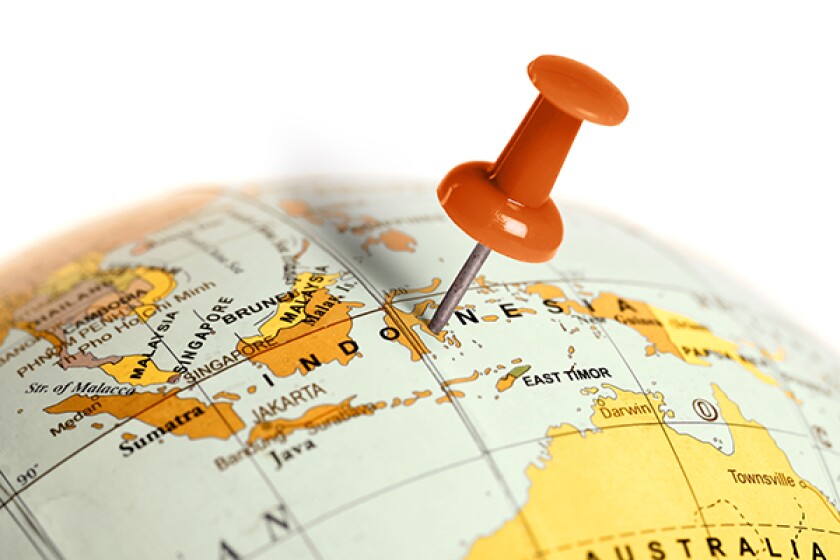Exemption from or relief on import duty and/or exemption of VAT on imported goods in contracts of work or coal mining enterprise work agreements
The Indonesian government, through the Minister of Finance (MoF), issued Regulation 116/PMK.04/2019 (PMK-116) on August 13 2019. This regulation concerns the exemption from or relief on import duty and/or exemption from VAT on imported goods as regards contracts of work or coal mining enterprise work agreements. Through the issuance of PMK-116, the previous regulation, PMK-259/PMK.04/2016, is revoked and rendered invalid.
The essence of PMK-116 can be summarised as follows. The MoF provides a facility for exemption from or relief on import duties on imported goods and/or exemption of VAT on imports of taxable goods (BKP) in the framework of contracts of work (KK) or work agreements between the government and coal mining entrepreneurs (PKP2B) conducted by contractors that meet the required criteria as set out in Table 1.
Imported goods that obtain these exemption/relief facilities can be transferred, re-exported, or destroyed by fulfilling the following requirements:
Table 1 |
|||
Exemption or relief granted in relation to the period specified in the contract |
Exemption or relief granted from the date of signing the contract until the 10th year of the production operating period |
Exemption or relief granted until the end of the contract period |
Exemption or relief granted from the date of signing the contract until the 10th year of the production operating period |
Contractors whose contract includes provisions regarding the granting of exemption from or relief on import duties on imported goods in the framework of a KK or PKP2B; and |
Contractors whose contract includes provisions regarding the granting of exemption from or relief on import duties on imported goods in the framework of a KK or PKP2B; and |
PKP2B contractors whose contract was signed before 1990; and |
Contractors whose contract includes provisions regarding the granting of exemption from or relief on import duties on imported goods in the framework of a KK or PKP2B as long as statutory provisions are met. |
Contractors whose contract includes provisions regarding the period for granting exemption from or relief on import duties on imported goods in the framework of a KK or PKP2B. |
Contractors whose contract does not include provisions regarding the period for granting exemption from or relief on import duties on imported goods in the framework of a KK or PKP2B. |
PKP2B contractors whose contract includes provisions regarding the granting of exemption from or relief on import duties on imported goods in the framework of PKP2B; |
Contractors whose contract does not include provisions regarding the granting of a VAT exemption for imports of BKP in the framework of a KK or PKP2B; or |
Contractors whose contract includes provisions regarding the granting of a VAT exemption for the importing of BKP in the framework of a KK or PKP2B; and |
Contractors whose contract includes provisions regarding the granting of a VAT exemption for the importing of BKP in the framework of a KK or PKP2B; and |
PKP2B contractors whose contract does not include provisions regarding the period for granting exemption from or relief on import duties; and |
Contractors whose contract includes provisions regarding the granting of a VAT exemption for imports of BKP in the framework of a KK or PKP2B as long as statutory provisions are met. |
Contractors whose contract includes provisions regarding the period for granting a VAT exemption for the importing of BKP in the framework of a KK or PKP2B. |
Contractors whose contract does not include provisions regarding the period for granting a VAT exemption for the importing of BKP in the framework of a KK or PKP2B. |
PKP2B contractors whose imported goods are state property. |
|
The transfer of imported goods that obtain facilities can be done after two years from the date of the customs import declaration and after obtaining a transfer permit issued by the head of the customs office;
Imported goods that obtain facilities can be re-exported by submitting a customs export declaration to the customs office; and
Imported goods that obtain facilities can be destroyed after two years from the date of customs import declaration and after obtaining a transfer permit issued by the head of the customs office. In these circumstances, only goods that have no economic value can be destroyed.
If imported goods with these exemption/relief facilities are transferred, re-exported, and/or destroyed without fulfilling the above requirements, those goods will become subject to import duty, VAT and/or administrative sanctions in accordance with statutory provisions in the field of customs and/or taxation.
The PMK-116 will become effective on October 11 2019 (60 days after the date this regulation was announced).
Procedure for the submission and settlement of VAT restitution for individual foreign passport holders
On August 23 2019, the Indonesian government, through the MoF, issued Regulation 120/PMK.03/2019 (PMK-120) concerning the procedure for the submission and settlement of requests for restitution of VAT on personal goods of individual foreign passport holders.
Amounts of VAT paid by foreign tourists can be refunded as long as the following requirements are met:
The value of the VAT is at least IDR 500,000 ($35); and
The purchase of goods is carried out within the one–month period preceding the foreign tourist's departure from Indonesia.
Foreign tourists in this context who are eligible for requesting VAT refunds are persons who are neither Indonesian citizens nor permanent residents of Indonesia, who remain in Indonesia for no longer than 60 days after the date of their arrival.
The VAT restitution request must be made to the Director General of Tax (DGT) through the Airport VAT Restitution Implementation Unit (UPRPPN) by producing both the goods and the relevant supporting documents, such as passport, departure boarding pass, and special tax invoices that were issued by the VAT entrepreneur retail stores in relation to the purchased goods.
The PMK-120 will become effective on October 1 2019. Through the issuance of PMK-120, the previous regulation, PMK-76/PMK.03/2010, is revoked and rendered invalid.
More entities permitted to provide bookkeeping services in foreign currency using foreign languages
The Indonesian government, through the MoF, issued regulation 196/PMK.03/2007 that has been amended several times, through Regulation 24/PMK.011/2012, Regulation 1/PMK.03/2015, and most recently Regulation 123/PMK.03/2019 (PMK-123).
This amended regulation expands the scope of the entities eligible for providing bookkeeping services in foreign languages and using foreign currencies, to include the following:
Taxpayers in the framework of a contract of work operating under a contract/agreement with the Indonesian government as referred to in the provisions of the legislation in the field of mineral and coal mining; and
Collective investment contracts (KIK) that issue mutual funds denominated in US dollars and have obtained an effective notification letter of registration statement from an independent institution that regulates and supervises financial services in accordance with statutory provisions in the field of the Financial Services Authority (OJK).
The PMK-123 became effective on August 27 2019.
Updates on preliminary refunds of overpaid tax
The Indonesian government, through the MoF, has issued Regulation 117/PMK.03/2019 (PMK-117), being an amendment to the MoF Regulation 39/PMK.03/2018 concerning the procedure for preliminary refunds of overpaid tax.
The salient points in the new provision are as follows:
Now included as taxable entrepreneurs are state-owned enterprises and regional-owned enterprises in accordance with the provisions of the legislation governing state-owned and regional-owned enterprises;
The addition of criteria for taxable entrepreneurs who carry out certain activities and are designated as low-risk taxable entrepreneurs in the fields of pharmaceutical wholesale, medical device distribution, and companies directly owned by a state-owned enterprise with share ownership of more than 50%;
An additional requirement for consideration as a low-risk tax entrepreneur is that the taxable entrepreneur must have submitted VAT returns for the previous 12 months; and
Regulation on the completeness of documentation in applications for becoming a low-risk taxable entrepreneur.
The PMK-117 became effective on August 19 2019.
Amendment to temporary import regulations
The Indonesian government, through the MoF, has issued Regulation 106/PMK.04/2019 (PMK-106) being an amendment to MoF Regulation 178/PMK.04/2017 concerning temporary imports.
Details of the amendments are as follows:
Amends provisions relating to the type of temporarily imported goods that are eligible for an exemption from import duty and eliminates certain provisions relating to the type of temporarily imported goods;
The temporary import period is provided in accordance with the intended use within a maximum period of one year and can be extended for a maximum of three years, starting from the import customs notification providing the number and date of registration;
Adds a provision in connection with the supporting evidence of the temporary import period for goods imported for the purpose of exhibitions, seminars, conferences, and similar activities;
Adds one requirement to the procedure for obtaining a temporary import permit, namely providing the particular location, in the case that the temporarily imported goods are used for the purpose of exhibitions, seminars, conferences, and similar activities;
Amends provisions in connection with the format of the Decree of the Minister of Finance concerning provisional import licences using the format listed in MoF Regulation 178/PMK.04/2017 concerning temporary imports;
Adds a provision in connection with guarantees for the temporary admission of goods; guarantees are used in accordance with statutory provisions regarding guarantees in the framework of customs;
Adds a provision in connection with guarantees for temporarily imported goods for the purposes of motor vehicle exhibitions whereby the collateral used must take the form of cash or a bank guarantee; and
Adds a provision in connection with the procedure for the submission of guarantees, which must be carried out in accordance with the provisions of the legislation regarding guarantees in the framework of customs.
The PMK-106 became effective on August 12 2019.
Anti-dumping import duty levied on products imported from several countries
The Indonesian government, through the MoF, has issued regulations relating to the imposition of an anti-dumping import duty on certain products imported from China, Singapore, Ukraine, India, and Taiwan. This regulation was issued in connection with an investigation by the Indonesian Anti-Dumping Committee, which concluded that a dumping margin for exporters/manufacturer exporters still existed.
For this reason, the MoF issued Regulation 111/PMK.010/2019 (PMK-111) regarding the imposition of anti-dumping import duty on the import of hot-rolled plate (HRP) products from China, Singapore, and Ukraine. For imported goods in the form of flat-rolled iron or steel products originating from China, Singapore, and Ukraine, an anti-dumping import duty is imposed: at the rate of 10.47% on goods originating in China; 12.50% on goods originating in Singapore; and 12.33% on goods originating in Ukraine.
The PMK-111 became effective on August 14 2019 and will be valid for five years after that date.
The MoF also issued Regulation 114/PMK.010/2019 (PMK-114) regarding the imposition of anti-dumping import duty on the importing of polyester staple fibre (PSF) products from India, China, and Taiwan. The PSF products are subject to duties as shown in Table 2.
Table 2 |
||
Country of origin of goods |
Name of exporter/manufacturer exporter |
Percentage of anti-dumping import duty due |
India |
Reliance Industries |
5.82 |
Ganesh Polytex |
16.67 |
|
Exporters/other manufacturer exporters |
16.67 |
|
China |
Xiamen Xianglu Chemical Fibre |
13.00 |
Jinjiang Kwan Lee Da Hesne-Bonded Fabric |
Not subject to anti-dumping import duty |
|
Huvis Sichuan Corporation |
Not subject to anti-dumping import duty |
|
Exporters/other manufacturer exporters |
16.10 |
|
Taiwan |
All exporters/manufacturer exporters |
28.47 |
Table 3 |
||
Country of origin of goods |
Name of exporter/manufacturer exporter |
Percentage of anti-dumping import duty due |
China |
Jiangsu Zhonglu Technology Development |
9.20 |
Jiangsu Guowang High-Technique Fibre |
||
Suzhou Shenghong Fibre |
||
Zhejiang Hengyi High-Tech Materials. |
9.40 |
|
Zhejiang Hengyi Polymer |
||
Zhejiang Hengyi Petrochemicals |
||
Zhejiang ShengYuan Chemical Fibre |
5.40 |
|
Other exporters/manufacturer exporters |
15.00 |
|
The PMK-114 became effective on August 18 2019 and will be valid for three years after that date.
The MoF also issued Regulation 115/PMK.010/2019 (PMK-115) regarding the imposition of anti-dumping import duty on the importing of spin drawn yarn (SDY) products from China. Imported goods in the form of synthetic filament yarn (with special criteria as described in the regulation) are subject to anti-dumping import duty as shown in Table 3.
The PMK-115 became effective on August 9 2019 and will be valid for three years after that date.
GNV Consulting
T: +62 21 2988 0681 and +62 21 2988 0681













